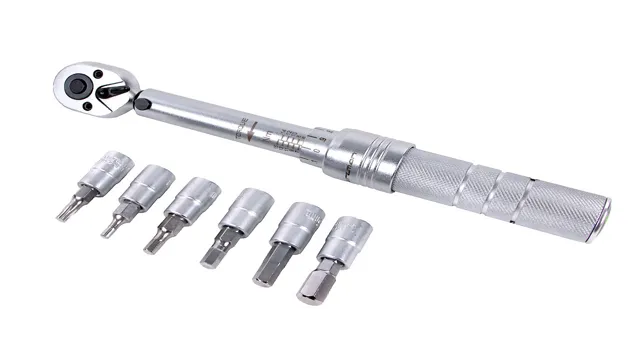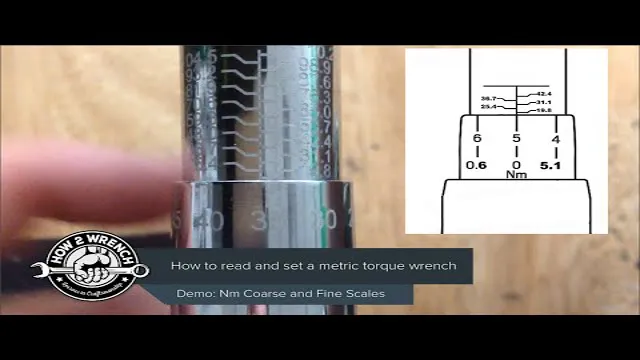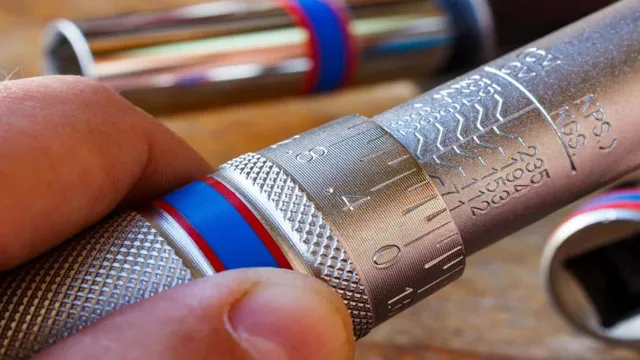
Are you preparing for an oil change on your vehicle and wondering if you need a torque wrench? Well, the answer is not a simple yes or no. It depends on the type of oil filter you have and the specifications provided by your manufacturer. A torque wrench is used to tighten bolts and nuts to a specific torque value, which ensures that they’re not too loose that they cause leaks or too tight that they damage the parts.
When it comes to an oil change, the filter is a crucial component that needs to be tightened to the manufacturer’s recommended torque specifications. Using a torque wrench isn’t necessary for all oil filter types. Some oil filters come with a built-in grip and don’t require a tool to tighten them.
Other filters, however, require a specific torque value for safe installation, and this is where a torque wrench comes in handy. Keep in mind that over-tightening the oil filter can damage the rubber gasket that’s designed to keep the oil from spilling out of the filter and on to your engine. On the other hand, if the filter isn’t tightened enough, it may loosen over time and result in a messy and costly oil leak.
In a nutshell, if your oil filter requires a specific torque value, it’s best to use a torque wrench to ensure that it’s tightened to the right specification. Besides, purchasing a torque wrench is a wise investment in the long run, especially if you’re a DIY car enthusiast.
Understanding the Importance of Torque Wrenches
If you are changing your oil and wondering if you need a torque wrench, the answer is probably yes. A torque wrench is an essential tool for any DIY mechanic or professional. They ensure that bolts and nuts are tightened to the manufacturer’s recommended specifications, preventing over and under-tightening, which can cause damage to your engine or parts.
This is especially important when it comes to critical fasteners that affect safety, like those in suspension, brakes, or steering systems. Even when it comes to an oil change, over-tightening the drain plug can strip the threads and cause leaks, while under-tightening can also lead to leaks or even the plug falling out altogether. Investing in a quality torque wrench can give you peace of mind knowing that your vehicle is properly maintained and safe to drive.
It’s definitely worth the investment for the long-term health of your vehicle. So, to answer the question, yes, you do need a torque wrench for an oil change.
What is a Torque Wrench?
A torque wrench is a specialized tool used for tightening nuts and bolts to the correct torque specifications. This is important because over-tightening or under-tightening can lead to serious safety concerns or damage to the equipment being worked on. The torque wrench allows for precise measurement of the amount of force being applied, ensuring that the fasteners are tightened to the manufacturer’s recommended specifications.
It works by applying a pre-set amount of torque to the fastener and then clicking or releasing once that torque is reached. This allows the user to tighten the fastener accurately and consistently. It’s essential to use the right torque wrench for the job as different fasteners require different levels of torque.
Investing in a torque wrench is a wise decision, especially for those working in the automotive or construction industry. By using a torque wrench, you can ensure that your work is of the highest quality and that the equipment is safe to use.

Why Use a Torque Wrench?
If you’ve ever worked on a car or machinery, you know how important it is to ensure that everything is tightened to the correct specifications. That’s where a torque wrench comes in. This tool is used to apply a specific amount of torque to a bolt or nut, ensuring that it is tightened to the manufacturer’s specifications.
Using a torque wrench can prevent over-tightening, which can lead to stripped threads or a damaged component, as well as under-tightening, which can result in a loose or dangerous connection. Think of it like baking a cake – if you don’t use the correct amount of each ingredient, the end result won’t be what you intended. The same goes for mechanical connections – if you don’t use the correct amount of torque, the end result can be catastrophic.
So, if you want to ensure that your bolts and nuts are tightened correctly, investing in a torque wrench is a wise choice.
Benefits of Using a Torque Wrench During Oil Change
As a car owner, it is crucial to understand the importance of using a torque wrench during an oil change. Torque wrenches are specialized tools that are designed to help tighten bolts and nuts with the right amount of force. This is essential when changing the oil as it ensures that the drain plug is tightened securely enough to prevent leaks, but not too tight to cause damage.
Using a torque wrench also helps ensure that your car’s engine has the correct oil level, which is essential for optimal performance and longevity. Additionally, a torque wrench can save you money by preventing potential engine damage that could result from over-tightening or under-tightening the oil plug. Overall, using a torque wrench during an oil change is a simple yet crucial step that can significantly benefit your car’s health and performance.
Factors to Consider When Deciding Whether to Use a Torque Wrench
If you’re wondering whether or not you need a torque wrench for an oil change, there are a few factors to consider. First, think about the type of vehicle you have and the specifications for the oil filter and drain plug. Many newer vehicles have specific torque requirements for these components, and using a torque wrench can help ensure that they are tightened to the correct level.
Additionally, if you’re performing maintenance on other parts of your vehicle that require specific torque settings, such as the wheels or engine components, a torque wrench is essential. Ultimately, using a torque wrench can help prevent over-tightening or under-tightening, which can cause damage to your vehicle and potentially even lead to safety issues. So, if you’re serious about proper vehicle maintenance and want to ensure that everything is tightened to the correct level, investing in a torque wrench is a smart decision.
Type of Car and Engine
When it comes to deciding whether or not to use a torque wrench, one of the most important things to consider is the type of car and engine involved. Different engines have different torque requirements, and using the wrong amount of torque can spell disaster for your engine and overall performance. For example, high-performance engines like those found in sports cars can require much more precision and finesse than a standard vehicle.
Additionally, there are different types of torque wrenches available, each suited for a different type of engine. It’s important to do your research and consult with a professional to ensure you’re using the right tool for the job. Don’t risk damaging your engine or compromising performance by neglecting to use a torque wrench when it’s needed.
It’s better to be safe than sorry, and investing in a quality torque wrench can save you time, energy, and potential headaches down the road.
Type of Bolt or Nut
When it comes to tightening bolts or nuts, there are a few factors to consider before deciding whether to use a torque wrench or not. The first factor to consider is the type of bolt or nut being used. Some bolts may be designed to be tightened to a certain level of torque, while others may not require the same level of precision.
Another factor to consider is the application or situation in which the bolt or nut is being used. For instance, if the bolt or nut is being used in a critical application where accuracy is crucial, such as in a car’s engine or in aerospace parts, then using a torque wrench is highly recommended. However, if the bolt or nut is being used in a less critical application, using a torque wrench may not be necessary.
Ultimately, the decision whether to use a torque wrench or not should be based on the specific needs and requirements of the application at hand.
Oil Drain Plug Material
When changing the oil in an engine, the material of the oil drain plug is an essential factor to consider. Choosing the right material can ensure a secure and tight fit. Options for drain plug materials include steel, aluminum, and brass.
Steel is durable and strong, but may rust over time. Aluminum is lightweight and corrosion-resistant, but can easily strip if over-tightened. Brass is also corrosion-resistant and can prevent galvanic corrosion, but is not as strong as steel.
Another important factor to consider when changing the oil is whether to use a torque wrench. Using a torque wrench can help ensure that the drain plug is tightened to the manufacturer’s recommended specification, preventing leaks and engine damage. However, if the wrench is not calibrated properly or not used correctly, it can cause damage to the threads or lead to over-tightening, resulting in the need for costly repairs.
It’s important to follow the instructions carefully and use the right settings on the torque wrench. Ultimately, the decision whether to use a torque wrench depends on personal preference and experience. If you are unsure about using a torque wrench or are changing the oil for the first time, it may be best to consult a mechanic or experienced friend.
Remember to always double-check the tightness of the drain plug and look for any signs of leaking before starting the engine. By considering both the material of the drain plug and the use of a torque wrench, you can ensure a smooth and leak-free oil change.
Conclusion: To Use a Torque Wrench or Not?
In conclusion, while you don’t necessarily need a torque wrench for an oil change, it’s always wise to have one on hand to ensure that your car’s nuts and bolts are tightened to the manufacturer’s specifications. Besides, who doesn’t love the feeling of precision and control that comes with using a torque wrench? So, to avoid any future mishaps and ensure a smooth and efficient oil change, invest in a quality torque wrench and thank us later for the peace of mind it brings. After all, a well-oiled machine deserves a well-torqued machine.
Happy wrenching!”
How to Use a Torque Wrench During Oil Change?
If you’re not a professional mechanic, you may wonder if you need a torque wrench for an oil change. The answer is, it depends. While it’s not typically necessary for the average car owner to use a torque wrench during an oil change, it can be helpful and provide peace of mind.
A torque wrench ensures that bolts are tightened to the manufacturer’s recommended specifications, preventing over- or under-tightening. This is especially important for critical components like the oil drain plug or filter housing. Using a torque wrench can also help prevent damage to the vehicle and ensure a proper seal, preventing leaks and potential engine damage.
In short, if you want to be extra careful and ensure everything is tightened correctly, investing in a torque wrench is a smart move.
FAQs
What is a torque wrench and why do I need one for an oil change?
A torque wrench is a tool used to tighten bolts to a specific torque specification. It is important to use a torque wrench during an oil change to ensure that the oil drain bolt and oil filter are tightened to the manufacturer’s recommended torque level, preventing leaks and potential damage to the engine.
Are all torque wrenches the same?
No, torque wrenches come in different sizes, types, and levels of accuracy. It is important to select a torque wrench that is appropriate for the job at hand and to calibrate it periodically to ensure accuracy.
Can I use a regular wrench instead of a torque wrench for an oil change?
While it is possible to use a regular wrench to tighten bolts during an oil change, it is not recommended. Without a torque wrench, there is no way to ensure that the bolts are tightened to the correct torque specification, which can lead to leaks and other issues.
How do I know the torque specification for my oil drain bolt and oil filter?
The torque specification for your oil drain bolt and oil filter can be found in your vehicle’s owner’s manual or service manual. If you do not have access to these resources, you can contact a local mechanic or dealership for assistance.
Can I reuse the crush washer on my oil drain bolt?
No, it is recommended to replace the crush washer on your oil drain bolt with each oil change. The crush washer is designed to create a tight seal between the bolt and the oil pan, and reusing it can lead to leaks and potential engine damage.
Should I use thread sealant on my oil drain bolt?
No, it is not necessary to use thread sealant on your oil drain bolt. The crush washer is designed to create a tight seal, and using thread sealant can actually lead to over-tightening and potential damage to the oil pan.
What other tools do I need for an oil change besides a torque wrench?
In addition to a torque wrench, you will need a wrench or socket to remove the oil drain bolt and oil filter, a drain pan to catch the old oil, and new oil and a filter for the oil change. You may also want to have gloves, rags, and a funnel on hand.








